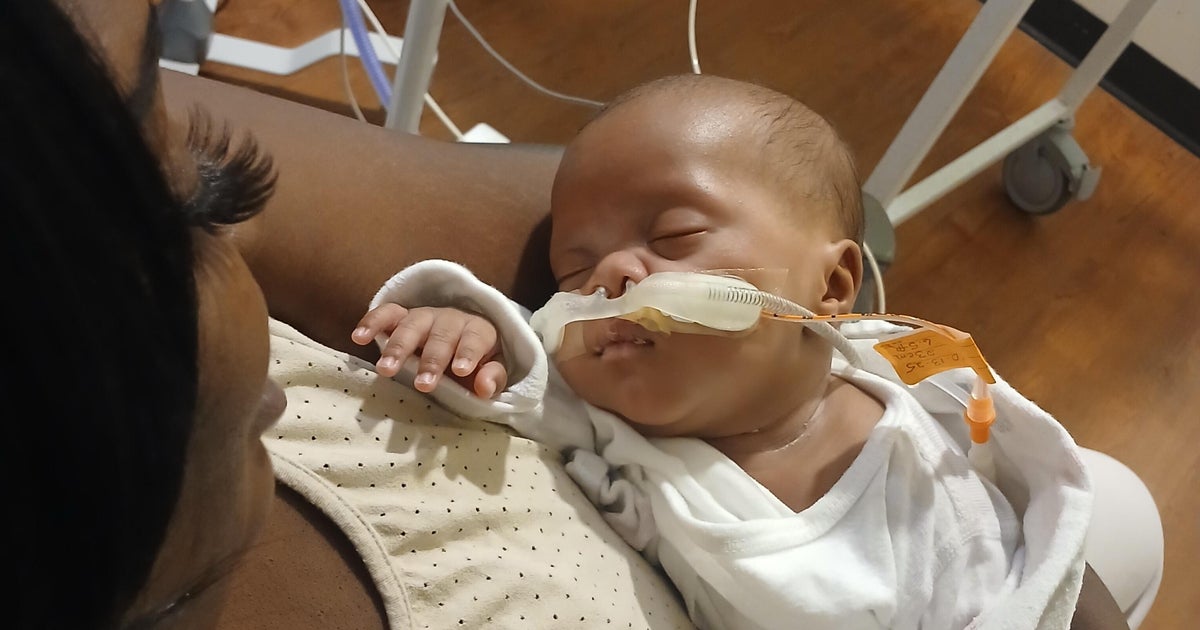Prenatal Testing Leads To Unexpected, Staggering Bills For Some Parents
NORTH TEXAS (CBSDFW.COM) - It's a test that helps pregnant mothers avoid surprises. But some said the real shock arrived in the mail.
Noninvasive prenatal testing or NIPT, is an emerging industry that's increasingly popular among new parents. The simple blood draw screens for genetic disorders and reveals the baby's gender during the first trimester.
But multiple parents said they were blindsided by the cost.
Whitni Hinojosa wanted to know her son was healthy. So in her first trimester, she opted for a NIPT test from Natera. A nurse claimed the test would cost less than $200, according to Hinojosa.
"I was happy that nothing was wrong, happy to know it was a boy," Hinojosa said.
Then, the bills came. Hinojosa received a bill from Natera for $611. The original amount Natera billed to her insurance company exceeded $4,000.
For months, Hinojosa badgered the company until someone finally agreed to reduce the bill to a third of the cost.
"Why charge that? If you know you're not going to get it?" Hinojosa said.
Natera is one of several companies that offer non-invasive prenatal testing.
In a statement, a spokeswoman for Natera says it provides customers a "personalized cost estimate," and patients can choose to either use their insurance benefit or pay $249 in cash.
Hinojosa said she never knew about that condition. She wonders what would have happened if she didn't fight the company so aggressively.
"It just doesn't seem right," Hinojosa said.
Pramee Mehta went through a similar process.
She said she wrote a $50 check for a test through the company, Recombine.
She thought the deal was done until she opened a bill for $5,000 several months later.
"I hadn't planned for a $5,000 bill for something I wasn't expecting to do," Mehta said.
Mehta said her insurance company refused to cover the cost because the test was elective. Instead the insurance company opted to file a claim with Recombine. The strategy worked.
In the end, Metha owed nothing, which made her question why she received the bill at all.
"I think that's their way of recovering whatever they can," Mehta said.
Medical ethicist Tom Mayo said some insurance companies may not cover the testing because the NIPT industry is still relatively new.
That's why patients should check their coverage before taking the test.
But Mayo said testing companies also have a responsibility.
"Should they be more transparent? They should be totally upfront," said Tom Mayo, an associate professor at the Dedman School of Law at Southern Methodist University.
Hinojosa got her peace of mind. But she said getting there caused undue stress and confusion.
"I think if they had a set price and told you that price upfront, they wouldn't get as many customers," Hinojosa said.
Patients should check if their insurance company covers NIPT testing. The Ones for Justice surveyed three major insurance companies.
UnitedHealthcare
"We cover prenatal testing, including blood and ultrasound tests, based on current medical research. We also cover DNA-based non-invasive prenatal testing as a screening tool for certain infant syndromes; when a woman is over age 35 at the time of delivery; specific issues with prior pregnancies or based on certain fetal ultrasound findings."
Humana
For its commercial members, Humana covers noninvasive prenatal screening checks for chromosomal abnormalities under the guidance of the member's physician. Their specific coverage policy can be found here online.
For Medicare members, Humana follows the Medicare National Coverage Policy. That coverage policy can be found on the Centers for Medicare & Medicaid Services website.
AETNA
"Aetna covers NIPT tests for screening pregnancies at high risk for Down syndrome. This test is more specific to identifying the potential for Down syndrome, as well as two other very rare conditions. For pregnant women at average risk, Aetna covers screening with serum analytes combined with fetal ultrasound. This screening can help identify a wider range of issues than the NIPT tests, such as obstetric complications, open fetal defects, or other fetal structural abnormalities. Measurement of serum analytes with ultrasound is the most widely used approach for screening and is the approach the American College of Obstetricians and Gynecologists and the Society for Maternal Fetal Medicine recommends for first-line or primary screening of average risk women."
Different testing companies also adhere to different billing practices. See their responses below.
Recombine
The company Mehta used, Recombine, stopped offering NIPT testing in 2018 after a merger with another company. A representative did not return a request for comment by deadline.
Progenity
"We are committed to operating in full compliance with all applicable laws and regulations, as well as payor contractual requirements and industry best practices. Our billing practices follow the accepted approach for laboratory service providers. Tests are ordered by qualified healthcare providers who are authorized by state law to order laboratory testing. When commercial health insurance information is provided on behalf of the patient, we submit a claim for reimbursement with the health plan. When we have a contract with that health insurance plan, we submit claims and the health plan reimburses based on the contracted rate. The majority of our business in Texas is covered by health plans with which we have contracts. In cases where we do not have a contract with the health plan, we bill for the laboratory services provided, and the health plan reimburses based on an amount that they deem acceptable. As with all healthcare services, patients are often responsible for co-pays and deductibles set by the health plan. We bill the patient for the Patient Responsibility amount per our contractual requirements when we have a contract with the health plan. When we do not have a contract with the health plan, we bill per the explanation of benefits provided by the health plan. For patients covered by government healthcare programs, we bill patients in accordance with the applicable program's requirements. Our billing department makes good faith efforts to collect patient responsibility amounts in accordance with federal, state, and contractual requirements. Because of our commitment to improving access to medically-necessary genetic testing, we offer qualifying patients the Peace of Mind program, a need-based financial assistance program based on federal poverty guidelines. We also offer flexible payment options. Our Peace of Mind program is consistent with industry practices."
Natera
"Natera is committed to patient access to high-quality, and affordable genetic testing. As such, Natera is an in-network provider with most health plans and has negotiated discounted rates with those plans. Natera offers a discounted cash price, to keep the test affordable, when a patient's insurance plan does not cover its non-invasive prenatal test (NIPT). We give patients a personalized cost estimate based on their plan's coverage policy, deductible, and coinsurance. Patients can choose whether to use their insurance benefit or pay a discounted cash price of $249. Natera also offers compassionate care program discounts for families experiencing financial hardship.
All patients receive an EOB from their insurer which includes the list price. The EOB is not a bill and does not reflect the contractual discounts we have negotiated with insurers or the application of any discounts for which the patient may be eligible. We provide patients with a personalized cost estimate which includes the insurance plan's coverage policy, and the patient's deductible and coinsurance. Patients can choose whether to use their insurance benefit or pay a discounted cash rate of $249. Patients often confuse an "Explanation of benefits" (EOB) with a bill. All patients receive an EOB statement which includes our list price. The EOB is not a bill and does not reflect the contractual discounts we have negotiated with insurers or the application of any discounts for which the patient may be eligible. Natera's contracted rate for NIPT with insurance companies is typically $700-$800, and most patients owe approximately $70–160, after their deductible is met. The list price does not reflect the discount we've negotiated with the insurance company. All patients receive an estimate of what they will owe after the insurance benefit is determined, and they have the option of using their insurance benefit or paying cash."








